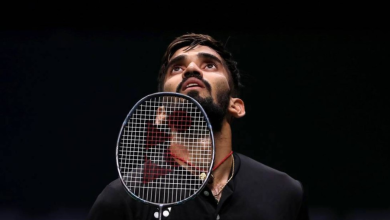Pravin Thipsay writes: Ding has given a new dimension to competitive chess

Ding Liren, a Chinese Grandmaster, is the new chess World Champion. Soak that in. It’s a great victory not just for Ding, but also for China and Asia.We have to look at the World Championship in a very different way. In some ways, it’s a trendsetter. If you look at World Championships of the past, they played in a particular way or style. There had a particular strategy or way of playing. It was a very strategic battle. What happened here, however, was more or less a battle of nerves and other sporting qualities rather than the ‘supposed’ quality of playing chess. (Grandmaster Pravin Thipsay has been analysing games of the World Chess Championship for The Indian Express. You can read his analysis of Game 14, Game 13, Game 12, Game 11, Game 10, Game 9, Game 8, Game 7, Game 6, Game 5, Game 4, Game 3, Game 2, and Game 1.)What happened in the tie-break on Sunday was simply Ding showing better presence of mind than his opponent, Russian Ian Nepomniachtchi. Ding showed far superior practical sporting wisdom and that really was the difference.
Ding also showed the ability to bounce back. We’ve seen that Nepo hasn’t shown great nerves but I was amazed with the flexibility of Ding’s play. He adjusted wonderfully to the scenarios, particularly in the last game. Because we now have engines, we know they have made a few makes, but 30 years ago, this would’ve been termed a perfect game.
It brought out the other elements of chess as well. It is believed that chess is more a scientific and logic-based game where stamina, endurance, and sporting ability do not matter that much. It’s the reason why it hasn’t been included in the Olympics because they don’t find it ‘sport-like’. I think this World Championship has shown that chess is changing.
What was different is that they didn’t just rely on strategic knowledge, but tried to get the best of their positions. There are two factors in a chess game: ‘How is your position’ and ‘How do you play your position’. Chess has perennially been about ‘how is your position’. It’s all about how likely you are to win because you are in a strong position.
Ding brought an entirely different aspect. He didn’t bother to see his position. He just decided that he’s just going to play for a victory. He failed sometimes, at times the games ended in a draw because he took a risk. But that didn’t stop him from sticking to his way of playing. Isn’t that what sport is all about?It’s a skill rather than technical knowledge of the sport.
We’ve seen that Nepo hasn’t shown great nerves but I was amazed with the flexibility of Ding’s play. (FIDE/Stev Bonhage)
The Chinese don’t have a chess school. They don’t really have their own style. Their theory and training methods are largely unknown. It will be interesting to know just what Ding was thinking during certain moments throughout the Championship. The Soviet school has been very kind in explaining its thinking process during the game. That sort of openness we haven’t seen in the Chinese school of chess because nobody has reviewed them as such. They are surely giving a greater dimension to chess and that’s the sporting element, rather than the knowledge-based game.
All our lives, we’ve spent finding out the correct move to play in a certain position but here is someone who is only asking himself: ‘How do I get a good result here’? This sort of thinking process we will have to instill in our students.
There’s surely something because even though the Chinese don’t have great exposure, they have had a women’s champion for the last three terms and now they have a World Champion. In the 2018 Olympiad, China won both the men’s and women’s titles. For the past 20 years, they have been dominating the women’s section. So clearly they are doing something right and the depth of Chinese chess is much more than what has been published.
If you look at the top Grandmasters, they want safety and don’t like uncertainty. They have a team of players to analyse their every move. More often than not, the player wins on the basis of his opening moves or strategy. Ding, on the other hand, was willing to take a risk in any position. It takes a lot of courage.Had he lost, it perhaps wouldn’t have mattered that much to him because he would know that he gave himself every shot at winning. It raises the question: do we really need to prepare our opening moves so well? Ding played a myriad of ‘ugly’ moves this Championship and still ended up winning. Most of his decisions came more from instinct. They were not necessarily scientific but more tactical. It makes me wonder, 10 years from now, will the chess world be concentrating on skill-building rather than knowledge building?
One thing is for sure. Ding has given a new dimension to competitive chess. And it’s likely to stay.
(Pravin Thipsay is an Indian Grandmaster and a recipient of the Arjuna Award)
Moves (Game 4 of tiebreak): 1.e4 e5 2.Nf3 Nc6 3.Bb5 a6 4.Ba4 Nf6 5.0–0 Be7 6.d3 b5 7.Bb3 d6 8.a4 Bd7 9.h3 0–0 10.Be3 Na5 11.Ba2 bxa4 12.Nc3 12…Rb8! 13.Bb1 Qe8! 14.b3 c5 15.Nxa4 Nc6 16.Nc3?! .a5 17.Nd2 Be6 18.Nc4 d5 19.exd5 Nxd5 20.Bd2 Nxc3?! 21.Bxc3 Bxc4 22.bxc4 Bd8 23.Bd2 Bc7 24.c3 f5 25.Re1 Rd8 26.Ra2 Qg6 27.Qe2 Qd6! 28.g3 Rde8 29.Qf3 e4?! 30.dxe4 Ne5 31.Qg2! Nd3 32.Bxd3 Qxd3 33.exf5 .Rxe1+ 34.Bxe1 Qxc4 35.Ra1? .Rxf5 36.Bd2 h6 37.Qc6 Rf7 38.Re1 Kh7 39.Be3 Be5 40.Qe8!? Bxc3 41.Rc1 Rf6! 42.Qd7 Qe2! 43.Qd5 Bb4 44.Qe4+ Kg8 45.Qd5+ Kh7 46.Qe4+ Rg6!! 47.Qf5 c4! 48.h4? Qd3! 49.Qf3 Rf6 50.Qg4 c3! 51.Rd1 Qg6 52.Qc8 Rc6 53.Qa8 Rd6?! 54.Rxd6 Qxd6 55.Qe4+ Qg6 56.Qc4! Qb1+ 57.Kh2 a4 58.Bd4 a3 59.Qc7? Qg6! 60.Qc4 c2 61.Be3 Bd6 62.Kg2 h5! 63.Kf1 Be5 64.g4 hxg4 65.h5 Qf5! 66.Qd5 g3 67.f4 a2! 68.Qxa2 Bxf4







